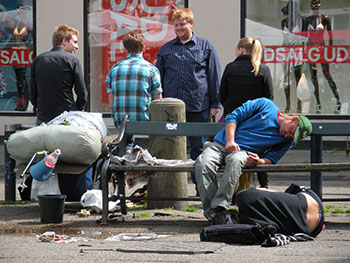A lot of people are living in a bubble, long ago even before the dreaded COVID-19 pandemic required quarantine and isolation. One of the most dangerous types of a bubble to be in is the one where there is denial and ignorance regarding the continued prevalence of the opioid overdose crisis. This a problem-centered on people overdosing on opioid medication who take medication not to be relieved of any pain or for any medical reasons but to satisfy the feeling of wanting to take drugs.
What Does Living in a Bubble Mean?
To live in a bubble means to be unaffected or detached from the rest of the world. In the context of protecting us from spreading the virus, living or working in a bubble is a good thing.
But when it comes to facing social issues and serious social problems, living in a bubble is not just bad, but it is also dangerous because there exists denial and ignorance about the crisis. These are very powerful factors that contribute to the worsening problem of the opioid overdose crisis in the country.
Denial is a real problem. Psychologically, denial is one of the many different human mechanisms that can be activated as a response to stimuli when the individual needs a way to cope with a situation. If accepting the situation is difficult or unacceptable, it is normal for the individual to resort to denial.
Many people refuse to believe that the opioid overdose crisis is a real problem. This is a clear manifestation of collective denial. That, or they refuse to believe that they or their loved ones (family and friends) could be among those currently suffering from opioid overdose and addiction. They refuse to accept that they need help. They are convinced this is none of their concern and they refuse to care about it.
Dr. Nicole Gastala, in a study entitled Denial: The Greatest Barrier to the Opioid Epidemic published in the journal Annals of Family Medicine, wrote:
If we are not recognizing addiction and recommending appropriate treatment, we will not be doing our part to curtail the opioid and heroin crisis, and, even worse, we will contribute to the opioid epidemic.”
Denial and Ignorance
Two reasons why it gets worse: denial and ignorance. These two often go side-by-side. If there is denial from among those who can influence the belief of others, these people become unaware of the problem and its many serious aspects. And because you are ignorant of the problem, you wouldn’t be able to detect it once you come face-to-face with it. Either you are lured into the life of opioid overdose and addiction or you see someone spinning down this dangerous rabbit hole but you don’t feel alarmed because you are ignorant. Carl L. Hart, in an article published in The Scientific American, wrote:
People are not dying because of opioids; they are dying because of ignorance.”
This has to change.
It does not help if we are in denial or if we encourage other people to believe that overdosing on opioids cannot happen to their family or friends because that is not true – opioid overdose and addiction affects different people from different walks of life across different demographic characteristics (age, gender, profession, ethnicity, location, etc.) A crucial part of the issue of denial in the opioid overdose crisis is denying that a certain demographic group is not susceptible to this threat. That is incorrect. The entertainment media has created and promoted a certain stereotype about what an opioid addict is supposed to look like but this is far from the truth. Everyone can succumb to addiction and overdose, if placed in a similar condition, and provided the same stimuli. That is what makes opioid overdose and addiction very powerful – it is easy to fall prey and it is difficult to get out, especially if people are in denial or ignorant.
Help Change the Way We as a Society Think.

It tells them it is okay to look away, and this is not just a passive way of refusing to give help, it is also enabling those addicted to opioids to continue their behavior instead of getting the help they need. People who are exposed to the culture of denial may have strong personal qualities that keep them from becoming addicted, but the problem does not end there. They may know someone else who is addicted or who could become an addict and they may behave in a way that does not help anyone because there are apathetic and ignorant.
Conclusion
Denial breeds ignorance. Adults who are in denial make their children and other impressionable people ignorant.
Address this problem by talking to your children and other young adults about opioid overdose and addiction problems. If you know an adult who is in denial or is unaware of the problem, make the effort to educate them as well. Explain to them why there are opioid crisis lock bags for medication at home used by family members taking medication. Explain to them why medication needs to be secured and out of reach of those who can potentially abuse it. Explain to them that the initial feeling of high or euphoria from opioid overdose and addiction is a temporary state and how it will lead to self-destruction (physically, physiologically, emotionally, and mentally) if not addressed properly. Most important of all, explain to them the importance of being aware of the problem, the importance of taking part in the effort to provide help and a long-term solution, the importance of addressing the issue of denial and ignorance not just with facts, but more importantly, with empathy and humanity.
